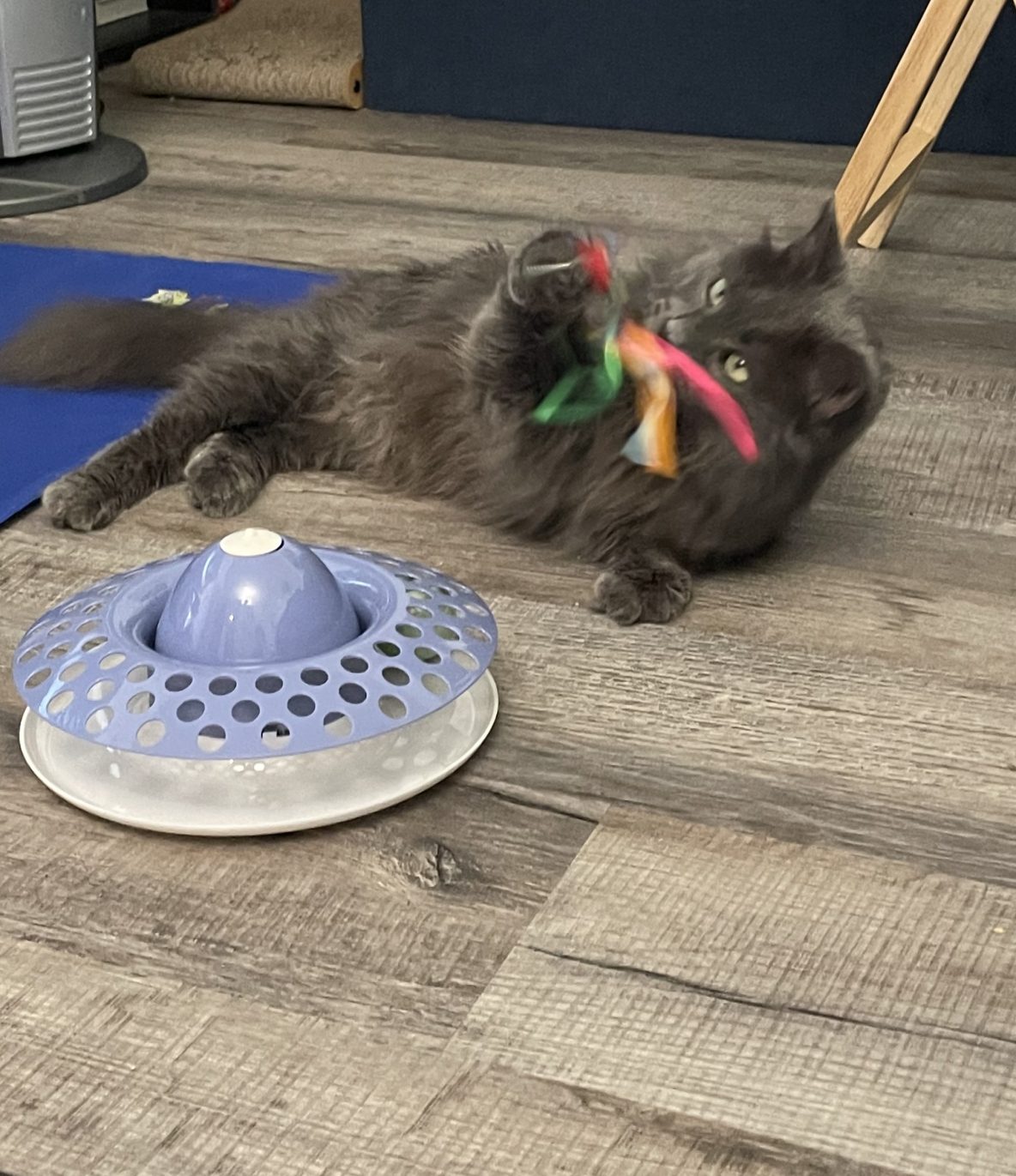Improves the Automated Experience
As a rule, I’m not a big fan of automated toys. I believe that simulating the hunting sequence with a wand toy or a toy tied to a string is important for a cat’s mental health. And automated toys move too monotonously to simulate prey. But Caroline’s Cats automated toy butterfly has features that improve the automated experience. Features that I haven’t seen in any other automated toy.
There’s an End to the Game
First, this toy will turn itself off in 5 minutes. Automated toys can overstimulate and frustrate a cat. The thing never “dies”, so the cat never really wins. But since this toy turns off, a timid cat can pounce, and a bold cat can pounce again. This toy comes with a replacement butterfly, so go ahead and let your cat enjoy the ‘kill”. The 5-minute timing worked well for the cats I tested it on. Of course, you should monitor your cat the first time you use it, to see how they react to it. You should turn it off if your cat looks frustrated. You can gradually give them more time with it turned on as they become accustomed.
Fun After the Chase
Another feature that springboards off the first are the balls on a track. This track serves as the base for the butterfly. There are two balls. One has catnip and the other jingles.
The end of motion is naturally enticing. The end of a flurry of activity could be a prey animal resting, and now easy pickings. When that butterfly turns off, a cat will likely take note. And playful cats will likely approach and bat the resting butterfly, setting the balls on the track in motion. This should draw their attention and further play. Both the still butterfly and the balls are easy for a cat to control, making them a successful hunter. And since the toy started off moving, it gets the cat’s attention far better than a non-moving toy.
Playful Cats Loved It
I tried this toy out on 5 cats: three playful cats and two elderly cats. All three playful cats loved it. The elderly ones were mainly interested in watching it.
A playful 6-year-old watched a bit, then attacked. Pinned the butterfly, released, watched, attacked. Then hung back, grooming and ignoring the toy. When it turned off, his interest was rekindled. He pinned the butterfly, but his attention was then drawn to the now-moving balls. Attack! He played with this toy a good 10 minutes. And he looked pretty satisfied with his hunting skills. I turned it back on 40 minutes later, and he reengaged. This was certainly a good toy for him. He is very active, so having a little help with playtime appealed to his owner.
A playful 4-year-old went right for the butterfly when it was in motion, and batted it as it moved. She attacked again when it turned off. This is a very needy cat, so this toy should come in handy to help disengage her from her owner now and then.
A moderately playful 11-year-old also enjoyed it. She played with both the butterfly and the balls on the track the entire 5 minutes the toy was on. When it turned off, she played with the balls another minute then lost interest. But 10 minutes later, when it was turned back on, she resumed play.
My Elderly Cats Less Interested
I also tried it out on my own cats. They are elderly cats who rarely play. I didn’t have much hope but I thought I’d try it. They both watched it intently for a minute or two, lying side by side, both of their heads synchronized to the circling butterfly. Then they went to sleep. What was comical was how they both woke up and snapped to when it turned off! Yes, change is provocative. They seemed as interested in it as in TV.
Helpful for Owners of Playful Cats
Some cats are very active, and need more stimulation than an owner can provide. While these cats will still need simulated hunts, Carline’s Cats Electric Rotating Butterfly can provide extra playtime. For maximum enjoyment for playful cats, put it away when not in use. I actually recommend rotating most of your cat’s toys, to keep them of interest.
Patience Fisher owns Patience for Cats LLC, a cat behavior business based in Pittsburgh, PA. She is Certified by the International Association of Animal Behavior Consultants. She holds a Bachelor’s in Biology, a Diploma of Feline Behavior Science Technology, and is a certified veterinary assistant.


Comments 2
Thanks so much for the review!
The Automated Butterfly Toy is a great play companion for cats! Cats are natural hunters, and this toy provides them with a moving target they instinctively need. The natural movement of the butterfly’s wings triggers their hunting instincts while keeping them physically active. Additionally, thanks to its automatic feature, your cat can play without tiring, which ensures they can have fun even when home alone. This toy helps your cat burn off energy while also contributing to their mental development. It’s the perfect choice for those looking for a fun and beneficial toy!